Surgically implanted computer chip in the brain for much improved cognitive abilities
Respondents to the Pew Research Center survey read the following statement: “New developments in understanding the brain are creating the possibility that doctors will be able to surgically implant a small computer chip in the brain. Right now, these implanted devices are being developed for people with some kind of illness or disability. But in the future, these implanted devices could potentially be available for use by healthy individuals, giving people a much improved ability to concentrate and process information in everyday life.”
The widespread availability of brain implants might seem like an idea from science fiction, but this may not be the case for much longer. For now, brain implants, also called neuroprosthetics, are available for medical patients with specific conditions. Cochlear implants are used by hundreds of thousands of people who are deaf or hard of hearing. Thousands of patients with Parkinson’s disease have a device implanted in their brain to send electrical pulses to help motor control. And, in April 2016, medical researchers from The Ohio State University and Battelle Medical Institute reported that they had helped a paralyzed patient regain control over movements of his right hand and fingers through the use of an implanted computer chip in the brain. (For more details on the science behind brain implants, see “Human Enhancement: The Scientific and Ethical Dimensions of Striving for Perfection.”)
The Pew Research Center survey takes an early look at public opinion about the possibility of using similar brain implants in people without a specific medical need for the device. Respondents were given a brief hypothetical scenario, republished in the sidebar, involving the surgical implantation of a computer chip in the brain for the purpose of giving people a much improved ability to concentrate and process information. They were then asked a series of questions about this scenario.
Americans are much more likely to express concerns about implanting computer chips in human brains than they are to say they would be enthusiastic about such an idea. And about twice as many say they would not want to use this technology themselves than say they would sign up for such an implant. U.S. adults are also more likely to see this type of technology as morally unacceptable, although a considerable share say they are not sure about the moral implications. There are large differences in views about this technology among religious groups. Similar to their thoughts about gene editing, Americans who have high religious commitment are more likely to see such a device as “meddling with nature.”
Americans concerned about brain implants to improve information processing
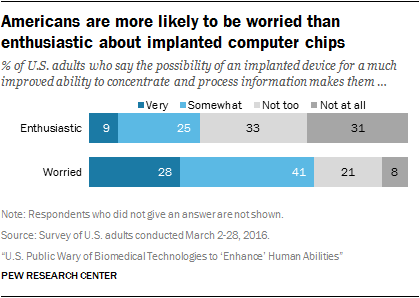
Seven-in-ten Americans say they are “very” (28%) or “somewhat” (41%) worried about the possibility of technology that would allow an implanted computer chip in the brain to give healthy people an improved ability to concentrate, but only about a third are “very” (9%) or “somewhat” (25%) enthusiastic about this prospect. A majority (64%) say they are “not too” or “not at all” enthusiastic about this potential technology.
While 20% of adults are both worried and enthusiastic about this idea, many more (48%) say they are at least somewhat worried and either not too or not at all enthusiastic about this possibility.
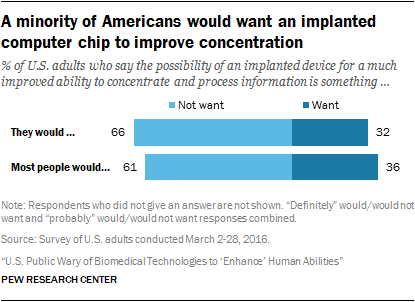
In keeping with the widespread concern about computer chips in the brain, about two-thirds of Americans (66%) say they would not want to use this technology themselves. A third (32%) would want an implanted device that would give them a much improved ability to concentrate and process information.
Similarly, 36% of adults expect most other people would want such a device, while roughly six-in-ten (61%) say most others would not want this.

Those familiar with brain chip implants somewhat more inclined to want such a device

Despite some public discussion about implanted devices to treat serious medical conditions, a majority of U.S. adults (61%) say they have heard nothing at all about the idea of an implanted computer chip in the brain. About a third of Americans (32%) say they have heard a little about this, while relatively few (6%) say they have heard a lot.
Those who are more familiar with the use of implanted devices to improve brain function are more inclined to want it for themselves. Among those who had heard at least a little about this topic, four-in-ten say they would want to use such a device, compared with roughly three-in-ten (28%) of those who had heard nothing at all prior to the survey.
More religious Americans less likely to want a computer chip to improve brain function
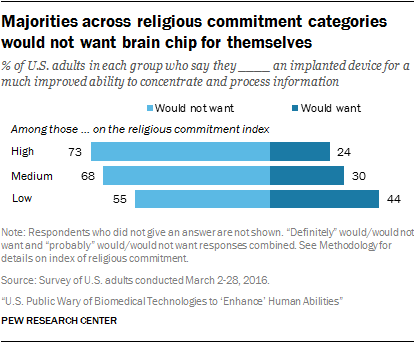
As is the case with views of gene editing, personal preferences for implanted devices are correlated with religious commitment, although majorities of Americans across all religious observance levels say they would not want a chip implanted in their brain to improve cognitive function.
A large majority (73%) of those who score high on a three-item religious commitment index say they would not want this type of enhancement, compared with 24% who would want it. By comparison, 55% of those with low religious commitment say they would not want a brain chip, while 44% say they would want this. Among Americans with a medium level of religious commitment, 68% say they would not want such a device and 30% say they would want it.
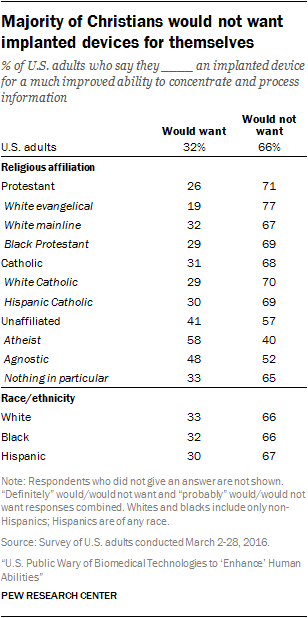
There also are large differences by religious affiliation on whether people would want an implanted computer chip in their brain. White evangelical Protestants are the least likely of all the major religious groups to say they would want an implanted device to improve their ability to concentrate and process information; 77% of white evangelical Protestants say they would not want this, while 19% say they would. Majorities of white Catholics (70%), black Protestants (69%), Hispanic Catholics (69%) and white mainline Protestants (67%) concur, saying they would not want such a device.
By comparison, atheists and agnostics are more likely to want a computer chip in their brain to improve brain function. Some 58% of atheists and roughly half (48%) of agnostics say they would sign up to receive such technology.

Americans closely divided over whether brain chip is meddling with nature
The survey asked respondents whether they think an implanted device to give healthy people a much improved ability to concentrate and process information would be “no different” than other ways humans try to better themselves or, rather, would be “meddling with nature and crosses a line we should not cross.” Americans are closely divided on this question, with 46% saying a computer chip implanted in the brain would be no different than other ways humans try to improve themselves and 51% saying an implanted device to improve brain function is crossing a line and meddling with nature.
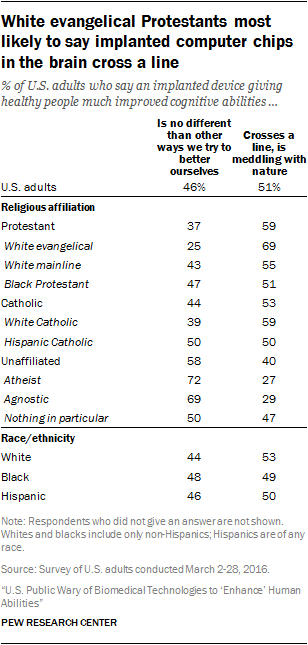
Responses to this question vary by religious commitment. Americans with low religious commitment (62%) are about twice as likely as those with high religious commitment (30%) to say an implanted device is similar to other things humans do to better themselves. And those with medium religious commitment are divided on this question, much like the general public as a whole.
There is also wide variation by religious affiliation on this question. White evangelical Protestants (69%) are most likely to say an implanted device crosses a line and would be meddling with nature, while atheists (72%) and agnostics (69%) are most likely to take the opposite position, saying this prospect is no different than other ways humans try to better themselves.
By comparison, Hispanic Catholics, black Protestants and those who describe their religious affiliation as “nothing in particular” are closely divided on this question.
Plurality of highly religious Americans say brain chip morally unacceptable
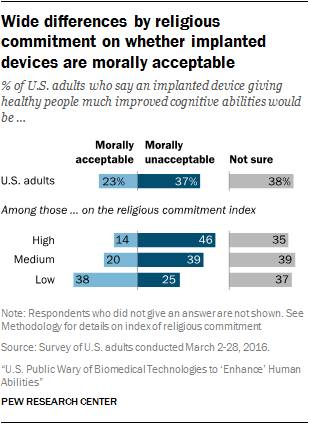
Given that most Americans are unfamiliar with this cutting-edge medical technology, it may not be surprising that a considerable share of respondents (38%) say they are not sure whether implanting a brain chip into a healthy person to improve cognitive function would be morally acceptable. Among those who express an opinion, more say this is morally unacceptable (37%) than say it is morally acceptable (23%).
Uncertainty about the moral implications of this technology exists among people of all levels of religious commitment; a third or more of those in low, medium and high commitment categories say they are unsure whether implanting a brain chip would be morally acceptable. But among people with high levels of religious commitment, a plurality (46%) say these implanted devices would be morally unacceptable, while just 14% say they are morally acceptable. The balance of opinion among those with low religious commitment is reversed, with 38% of this group saying these implanted devices would be morally acceptable and 25% saying they would be unacceptable.
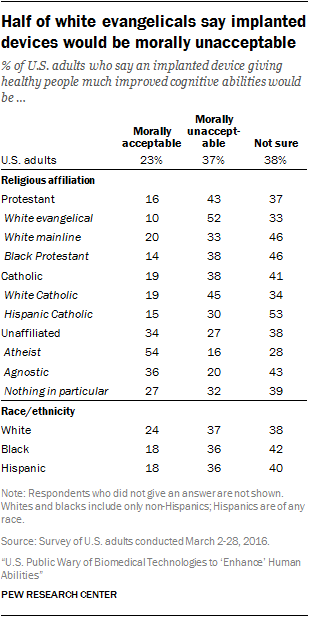
There are wide differences across religious identity groups on whether an implanted device for improved concentration and information processing would be morally acceptable or unacceptable. Just 10% of white evangelical Protestants say such a device would be morally acceptable, while about half (52%) say it is morally unacceptable. The balance of opinion is the opposite among atheists, with 54% saying this technology would be morally acceptable and 16% saying it is morally unacceptable.
Sizable shares of all major religious groups, however, say they are not sure about the morality of these devices.
Those who said these implanted devices would be morally unacceptable also were asked to explain why they feel this way. About one-in-five (21%) mentioned the idea that an implanted computer chip would be changing God’s plan, including some respondents who cited the “mark of the beast” described in the book of Revelation in the Bible. About as many (19%) expressed the view that an implanted device would disrupt nature, crossing a line that should not be crossed. And a similar share cited a concern that these devices could be used for nefarious motives, such as being hacked and controlled by those in power (17%).
Others said this technology is morally unacceptable because it is unnecessary or because it would provide an unfair advantage to some (and perhaps exacerbate inequality).
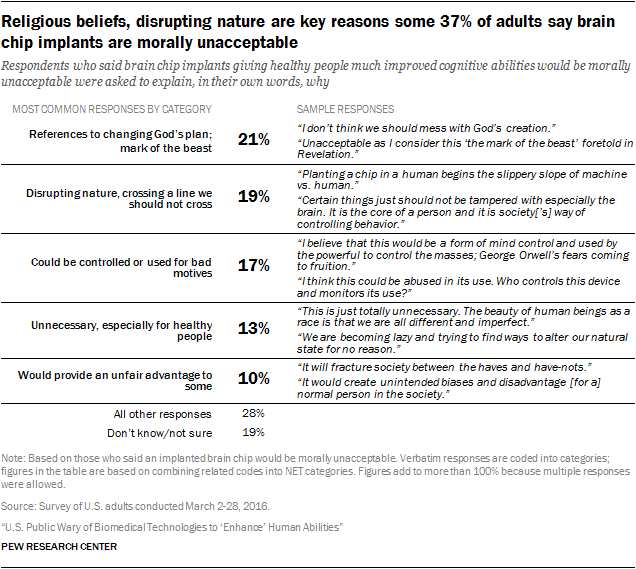
Of the 23% who think these implanted devices would be morally acceptable, one common reason given is that humans are always improving and should be bettering themselves (25%). Some 17% said such devices would be morally acceptable because the choice to have one implanted would and should be up to the individual. And another 16% say this implanted computer chip is no different from currently available enhancements that help us to achieve similar results.
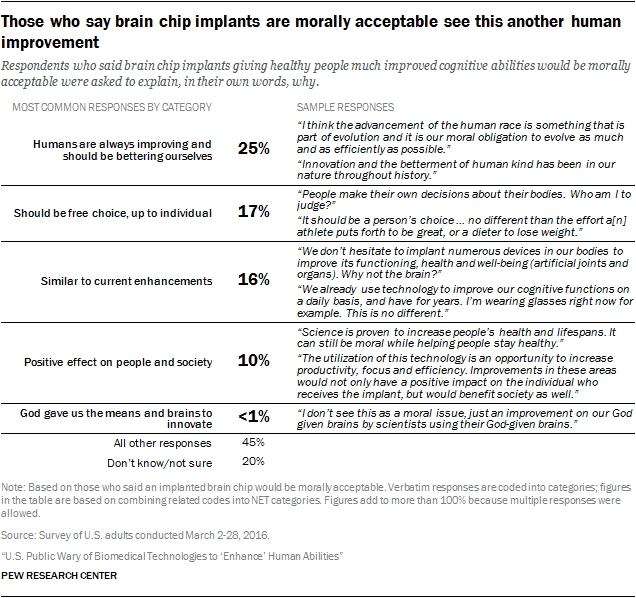
Chip implants expected to bring change, but most foresee negative outcomes
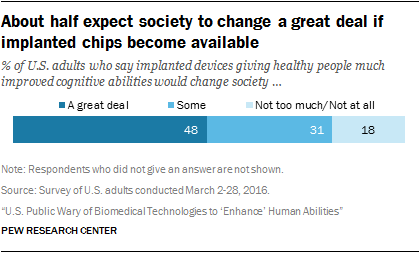
Most Americans say the use of implanted computer chips to improve cognitive function would change society either “a great deal” (48%) or “some” (31%). Just 18% of Americans say these devices would change society either “not too much” or “not at all.”
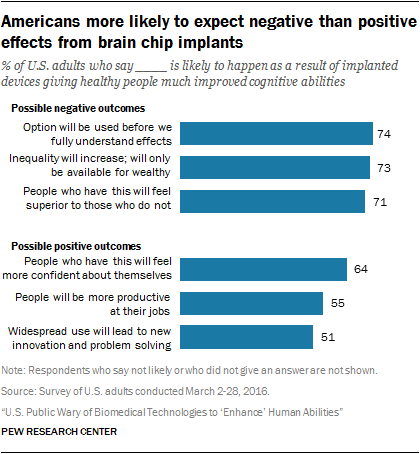
Americans are more inclined to expect negative effects from the availability of implanted computer chips to improve concentration rather than positive outcomes. Some 74% of Americans expect implanted devices will be available before their effects are fully understood. Additionally, similar shares say inequality will increase because implanted devices would be available only for the wealthy (73%) and that people who implanted devices will feel superior to those who do not (71%).
Fewer Americans, though still about half or more, foresee positive effects from implanted devices. About two-thirds (64%) say it is likely people who have computer chips in their brains will feel more confident about themselves and 55% say people will be more productive at their jobs with these devices. About half (51%) say widespread use of these devices will lead to new innovation.
Americans especially reluctant to enhance cognitive function beyond natural abilities
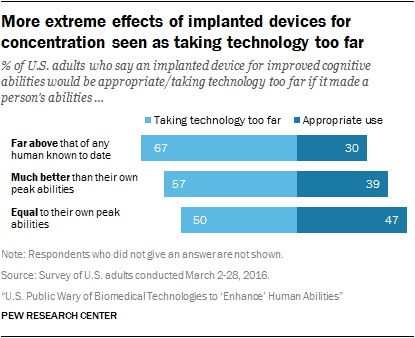
The survey sought to measure the extent to which people would be comfortable with this new human enhancement technology. Respondents were asked whether they would see the new development as “appropriate” or “taking technology too far” in a few different situations.
Americans are closely divided over whether an implanted device in the brain that gave people cognitive abilities equal to their own peak abilities is appropriate (47%) or taking technology too far (50%). But fewer (39%) say it would be an appropriate use of technology if it gave people abilities that were “much better than their own peak abilities before they had the implanted device.” And fewer still (30%) say it would be an appropriate use of technology if these implants gave people the ability to concentrate and process information at a level far above that of any human to date.
Americans more accepting of an implanted device if its effects temporary, controllable
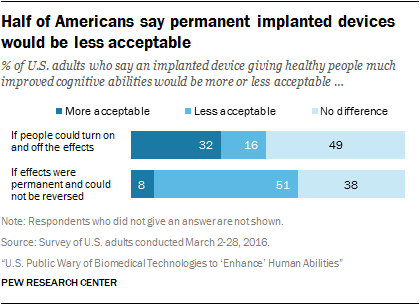
People are more accepting of implanted devices to improve concentration if they are able to control the effects of the device.
In a hypothetical scenario in which people could turn on and off the brain-enhancing effects of an implanted chip, about a third of U.S. adults (32%) say they would find the technology more acceptable, while half as many (16%) say this condition would make it less acceptable. Meanwhile, if the effects of the implant were permanent and irreversible, fully half of Americans (51%) say it would be less acceptable to them.
More adults see downsides than benefits for society from brain chip implants
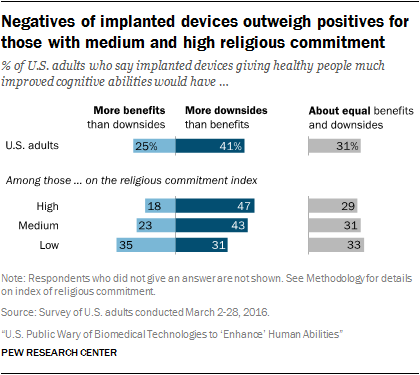
On balance, more Americans expect negative, rather than positive, effects for society from the prospect of an implanted device that would give healthy people much improved cognitive function. Some 41% of adults say the downsides would outnumber benefits for society, while only a quarter say the benefits would be greater. Another 31% expect the pluses and minuses to be about equal.
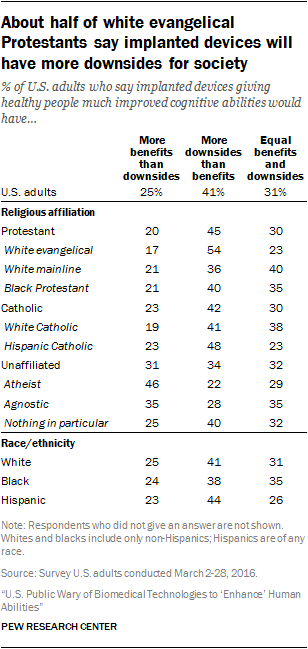
Those with high and medium levels of religious commitment say that, on balance, there would be more downsides than benefits for society from these implanted devices. But people with lower levels of religious commitment are more closely split, with 35% expecting more benefits and 31% more downsides for society. A sizeable share of each religious commitment category expects benefits and downsides to be about equal.
Protestants and Catholics are more inclined to say the downsides of these implanted devices would outnumber the benefits. About half of white evangelical Protestants (54%) say there would be more downsides, compared with 17% saying there would be more benefits than downsides.
Among the unaffiliated, atheists are more likely to say the benefits would outpace the downsides than to say the downsides would be greater (46% vs. 22%). Agnostics are closely divided (35% say there would be more benefits and 28% say there would be more downsides). And those who say their religious affiliation is “nothing in particular” are more likely to see the downsides from this type of human enhancement as outnumbering the benefits (40% vs. 25%).